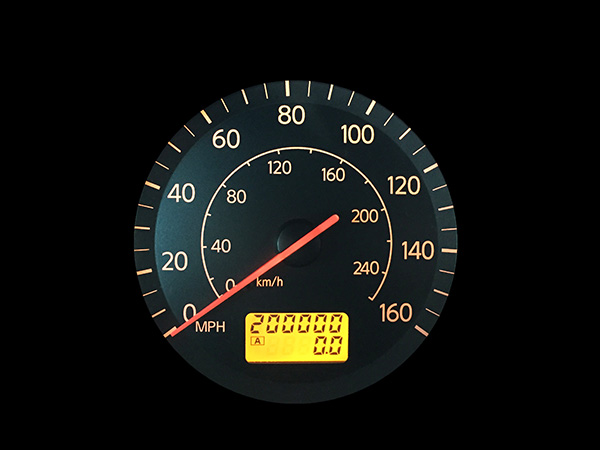
Driving with a broken speedometer is a significant safety hazard. Without knowing your actual speed, you are left to guess if you are within the speed limit or dangerously exceeding it. We will explain why this issue is so risky and why you should address it immediately.
The Role of a Speedometer
Your speedometer isn't just a decorative piece on your dashboard—it plays a vital role in safe driving. It's your go-to tool for monitoring your speed, ensuring that you're driving within legal limits and adapting to changing road conditions. When your speedometer fails, you lose an essential source of information, which can lead to serious consequences.
Monitoring Your Speed
Speed is one of the most critical factors in driving. Maintaining an appropriate speed allows you to react to sudden changes in traffic, weather conditions, or unexpected obstacles on the road. Without a functioning speedometer, you're essentially driving blind, which dramatically reduces your control over the vehicle. The faster you go, the less time you have to react—making it easier to lose control and increasing the likelihood of accidents.
Avoiding Legal Trouble
Traffic laws are there for a reason, and one of the most basic rules is adhering to speed limits. If you're caught speeding because your speedometer isn't working, you might still be held responsible. In fact, in many areas, it's illegal to drive with a non-functioning speedometer. You could face fines, penalties, or even more severe legal repercussions, especially if an accident occurs.
Common Causes of a Malfunctioning Speedometer
A faulty speedometer can stem from several issues, ranging from minor to serious. Identifying the root cause can help you understand the risk level and the urgency of the needed repairs.
Speed Sensor Issues
The speed sensor is a small device usually located on the transmission, responsible for sending your speed data to the speedometer. If the sensor malfunctions or fails, your speedometer will either stop working or provide incorrect readings. This is one of the most common causes of a faulty speedometer and can often be resolved with a quick replacement.
Wiring Problems
Your vehicle's wiring system is responsible for transmitting signals from the speed sensor to the speedometer. Over time, these wires can become damaged due to wear and tear, exposure to harsh conditions, or previous repairs. When the wiring is compromised, the speedometer might receive erratic signals, leading to inconsistent or inaccurate readings.
Dashboard Gauge Failure
Sometimes, the problem lies within the speedometer gauge itself. Internal mechanisms can wear out or become defective, especially in older vehicles. When this happens, the speedometer might display incorrect speeds or fail altogether, requiring a replacement of the gauge.
ECU (Engine Control Unit) Malfunctions
The ECU is the brain of your vehicle, controlling various systems, including the speedometer. If the ECU has a glitch or a more serious failure, it can affect the speedometer's accuracy. ECU issues are often more complex and might require extensive diagnostics and repairs.
The Risks of Driving with a Malfunctioning Speedometer
Driving with a faulty speedometer can lead to several risks that you may not have considered. Here's why it's essential to address this issue without delay:
Increased Accident Risk
When you can't accurately monitor your speed, the risk of accidents goes up. You may unknowingly drive too fast, reducing your reaction time and making it harder to stop in time to avoid collisions. Speed is a leading factor in road accidents, and without a working speedometer, you're more likely to be involved in one.
Reduced Fuel Efficiency
If you can't track your speed accurately, maintaining optimal driving conditions for fuel efficiency becomes difficult. Driving too fast or too slow can lead to higher fuel consumption, costing you more money in the long run. Over time, the inability to manage your speed properly can significantly impact your vehicle's overall efficiency.
Impact on Other Systems
A faulty speedometer can also signal deeper issues within your vehicle's systems. For example, problems with the speed sensor or ECU can affect other functions, such as cruise control, anti-lock brakes, or traction control. Ignoring a malfunctioning speedometer might lead to more extensive and expensive repairs down the line.
Legal and Financial Consequences
As mentioned earlier, driving with a non-functioning speedometer can lead to fines, penalties, and legal complications. In the event of an accident, you might have a hard time proving you were within the speed limit, which could negatively impact insurance claims or lead to increased liability.
How to Address a Faulty Speedometer
If you notice your speedometer isn't working correctly, it's crucial to take immediate action. Here's what you can do:
Pay Attention to Warning Signs
Modern vehicles often come equipped with warning lights or error codes that indicate when something is wrong with the speed sensor or related components. If you notice any warning lights on your dashboard, don't ignore them—have your vehicle checked as soon as possible.
Consult a Professional Technician
Diagnosing a faulty speedometer can be challenging, as it involves checking multiple components, from the speed sensor to the wiring and the ECU. A professional technician has the tools and expertise to identify the root cause of the problem and recommend the appropriate repairs.
Don't Delay Repairs
Driving with a malfunctioning speedometer is risky and illegal in many areas. The sooner you get it fixed, the better. Don't wait for the issue to escalate into something more serious or potentially dangerous.
Don't let a faulty speedometer put you at risk. Visit Roesbery Car Care Walnut Creek today for a thorough inspection and reliable repair services. Keep your driving safe and stress-free—book your appointment now!